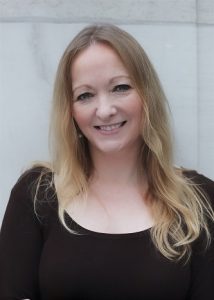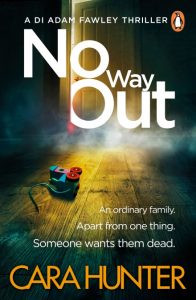You Shall Not Pass! Writer’s Block And How To Un-Stick It
 It’s a bit like ‘Macbeth’ for an actor – say ‘writer’s block’ to a novelist and they’re liable to go pale and break out in a cold sweat. And as for actually uttering those dreaded words yourself, well, that’s pretty much guaranteed to jinx anything you’re currently working on. But is writer’s block really a ‘thing’, or just people like me being hyper-superstitious? And if it does really exist, what can you do about it?
It’s a bit like ‘Macbeth’ for an actor – say ‘writer’s block’ to a novelist and they’re liable to go pale and break out in a cold sweat. And as for actually uttering those dreaded words yourself, well, that’s pretty much guaranteed to jinx anything you’re currently working on. But is writer’s block really a ‘thing’, or just people like me being hyper-superstitious? And if it does really exist, what can you do about it?
The first thing to say is that I do think writer’s block exists, but it’s definitely not a case of one-size-fits-all. In fact, there are probably as many types of barricade as there are people trying to leap them. That said, I suspect you could slot most common-or-garden varieties of writer’s block into one of the following fiendish five. It’s not a good place to find yourself in but we’ve all been there, and for what it’s worth, here are a few tips I’ve learned to help get you out.
Block One; ‘No idea at all’
That fabled blank-screen-and-winking-cursor moment when you sit there staring at the computer with absolutely no clue what to do next.
Way forward: Don’t just sit there, for a start. Get up, go out, or even better, read something, ideally something that’s nothing to do with the story you’re trying to write. Good ideas for fiction are rare and elusive and you have to give your brain time and space to develop something, rather than forcing the pace. I also find that ideas can evolve quite slowly, and it’s only after the whole thing has taken shape in your mind that it becomes obvious how long it’s been gestating. So, if you’re stuck on this particular fence, hang tight, hold your nerve, and relax…
Block Two: ‘Got an idea; now what?’
Having a great idea is one thing; turning that into a sequence of words that runs from #1 to approximately #100,000 is another thing entirely. The writerly equivalent of rabbit in the headlights.
Way forward: If you’ve never written a novel before, it might be a good idea to start with a short story, which can be a great confidence builder, and is in no way a ‘lesser’ form of fiction. In fact, it takes real talent to pull off a satisfying narrative in shorter form.
Another thing I find useful in this situation is to write a synopsis, starting with about a page in length, and then gradually increasing it, adding in detail, and sketching out specific scenes. Before you know it, it’s a dozen pages long, then two dozen, and then the stabilisers suddenly come off and you’re off and gunning.
Block Three: ‘I’ve written a great opening, but where next?’
This could well be the most insidious obstacle of all. Most of us can think of a million utterly fascinating ways to open a novel (especially a crime novel). Weird scenarios and wonderful, tantalising mysteries that leave the reader gasping and desperate to know the answer. But then what? And that, of course, is the question.
Way forward: This is another example of the value of a synopsis. I know there are writers out there who never suffer from Block One – who can sit down in front of a PC and just start writing, with no plan in their head (never mind on paper) for how it’s all going to come together. Hats off to people like that, but I’m definitely not one of them. I always need a fully worked synopsis, so I can be sure the mise-en-scène at the beginning will cash out into a satisfying conclusion at the end. In other words, in my book, for Block Three, prevention is definitely better than cure.
Block Four: ‘Bogged down halfway’
This is the one I face more often than any of the others. You’ve got 40,000+ written (sometimes more), you’re clear about your overall plan, and you can see your ending beckoning. There’s just this super-irritating penultimate bit to get through before you arrive.
Way forward: If you follow me on Twitter, you’ll know I had exactly this problem with the latest Fawley novel (the fourth one, out in October). And what I posted to illustrate it was a GIF of a snowplough, ramming and reversing and ramming again. Because that’s what I’ve learned about Block Four: the only way through is to keep on pushing, even if that means taking three steps back to go two steps forward. It can be demoralising and exhausting in equal measures, but take it from me, if you’re determined enough you’ll get there in the end.
Block Five: ‘I’ve got the plane up, but how do I get it down?’
This, of course, is another version of Block Three, only with a hell of a lot more at stake, because you’ll already have invested a huge amount of time and emotional energy getting to the home strait.
Way forward: Block Five is a bit like separation anxiety: whether consciously or unconsciously, you don’t actually want to let this baby go, either because you’re apprehensive about what happens next, or you want to put off the evil day when you have to show it to someone else. If that’s the case, just take a deep breath, give yourself a good talking-to, and go for it.
Sometimes, though, Block Five is the result of a genuine rock in the road: a plot element that you only realise at the eleventh hour doesn’t work, or the realisation that your characters have evolved in such a way that the ending you were initially planning no longer rings true. And you’re not alone: even great writers like Jane Austen have had that problem – in Mansfield Park in her case, where the marriage between Fanny Price and Henry Crawford that’s been becoming inevitable for at least a hundred pages is conveniently railroaded by him suddenly upping and eloping with someone else, so Austen can wrench the plot back to the ending she wants. Trouble is, this sort of act of God/deus ex machina/wholly implausible bolt from the blue is rarely wholly successful, even (dare I say it) in the hands of an utter genius.
Far better to think this sort of thing through in detail at the planning stage, of course, but if it’s too late for that, I’d recommend leaving the country. Seriously – I’m not joking. A complete change of surroundings could be the cleverest and most creative decision you ever make. The idea for Close to Home was born on a beach, and I’ve lost count of the number of times apparently intractable plot problems have suddenly resolved themselves in the calm internet-free isolation of a long-haul flight. Talking of which, where did I put that holiday brochure…..?
—
Cara Hunter is a writer who lives in Oxford, in a street not unlike those featured in her series of crime books. More than half a million copies of Cara’s DI Fawley books have been sold. Close to Home was a Sunday Times bestseller, a No1 Kindle bestseller, and a Richard & Judy book club pick.
Follow her on Twitter @CaraHunterBooks
NO WAY OUT
 DID YOU SEE ANYTHING ON THE NIGHT THE ESMOND FAMILY WERE MURDERED?
DID YOU SEE ANYTHING ON THE NIGHT THE ESMOND FAMILY WERE MURDERED?
From the author of CLOSE TO HOME and IN THE DARK comes the third pulse-pounding DI Fawley crime thriller.
It’s one of the most disturbing cases DI Fawley has ever worked.
The Christmas holidays, and two children have just been pulled from the wreckage of their burning home in North Oxford. The toddler is dead, and his brother is soon fighting for his life.
Why were they left in the house alone? Where is their mother, and why is their father not answering his phone?
Then new evidence is discovered, and DI Fawley’s worst nightmare comes true.
Because this fire wasn’t an accident. It was murder.
And the killer is still out there…
___________________________
‘I was hooked from beginning to end’ CLAIRE DOUGLAS
‘Cara Hunter has a gift for getting to the bare bones – literally – of both character and plot. A fast-moving chilling thriller’ JANE CORRY
‘I don’t know how Cara Hunter does it. The new DI Fawley novel is the best yet – and that’s saying something! I couldn’t read it quickly enough’ SIMON LELIC
‘Cara Hunter is a brilliant plotter, but it’s her masterfully drawn characters that really make her novels stand out’ RACHEL ABBOTT
‘I LOVED No Way Out. My heart was in my mouth the entire second half’ SARAH J. NAUGHTON
‘No Way Out is a cracking detective novel that pulsates with authenticity’ MICHELLE FRANCIS, author of The Girlfriend
Category: Contemporary Women Writers, How To and Tips






























